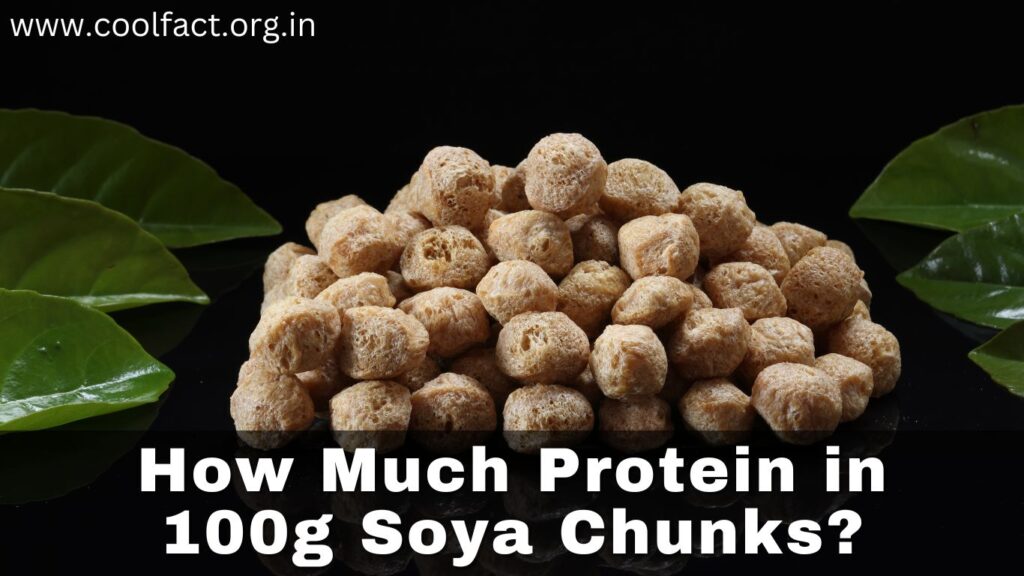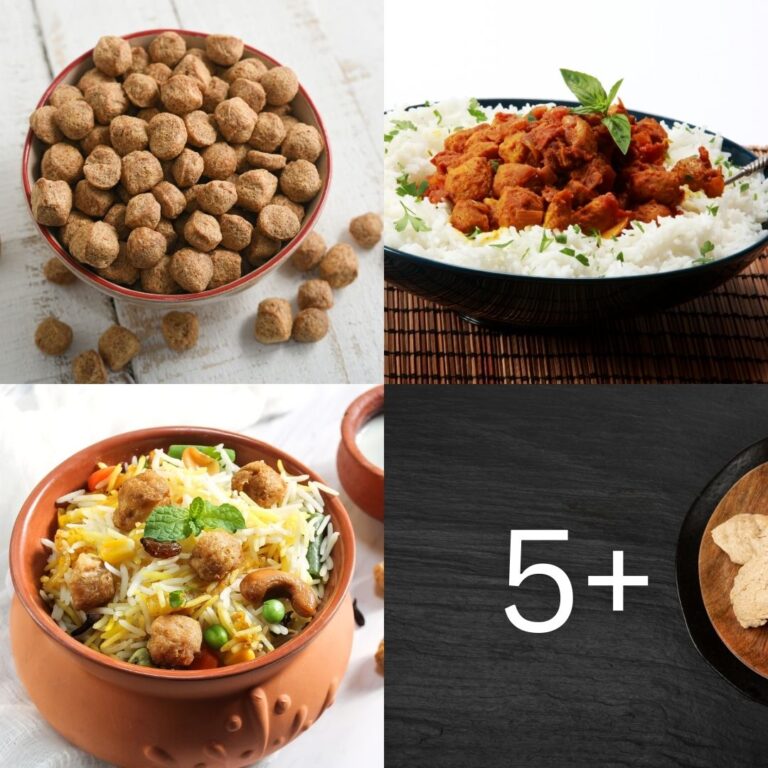How Much Protein in 100g Soya Chunks? Soya chunks, fondly known as “vegetarian meat,” are an affordable, protein-rich superfood that caters to a variety of dietary needs. Derived from defatted soy flour, these small but mighty nuggets boast a dense nutritional profile that makes them ideal for muscle-building, weight management, and overall well-being. Lightweight, easy to prepare, and adaptable to countless recipes, soya chunks seamlessly fit into diets of all kinds. Whether you’re a fitness enthusiast or just aiming for a healthier lifestyle, soya chunks are your ultimate nutritional ally. Let’s explore why they deserve a prime spot in your daily diet and how they can transform your meals into nutrient-packed delights.

Nutritional Value of Soya Chunks (Per 100g) How Much Protein in 100g Soya Chunks?
| Nutrient | Amount |
|---|---|
| Protein | 52g |
| Carbohydrates | 33g |
| Dietary Fiber | 13g |
| Fat | 0.5g |
| Calories | 345 kcal |
| Calcium | 350mg |
| Iron | 20mg |
| Magnesium | 250mg |
| Potassium | 500mg |
| Vitamin B6 | 0.5mg |
3 Science-Backed Reasons Why Protein is Essential
- Muscle Growth and Repair
Protein forms the foundation of muscle tissues. Adequate protein intake aids in repairing micro tears caused by physical activity, enhancing muscle development, and reducing recovery time after workouts. Soya chunks’ high protein content makes them a go-to for athletes and fitness enthusiasts. - Supports Weight Management
High-protein foods like soya chunks help regulate hunger hormones, keeping you fuller for longer and reducing unnecessary cravings. This not only aids in effective weight management but also promotes sustainable eating habits. Soya chunks’ fibre content further complements this process by supporting digestion. - Strengthens Immune Function
Protein is vital for producing antibodies, enzymes, and hormones that fortify your immune system. Soya chunks, being a complete protein source, provide all essential amino acids needed to keep your body’s defences strong and resilient against diseases.
Also Read:
Mango Fruit Calories: How This Sweet Tropical Delight Fits into Your Diet!
10 Health Benefits of Soya Chunks
- Provides a high-quality protein boost, ideal for vegetarians and vegans.
- Aids in lowering cholesterol levels, promoting heart health.
- Packed with dietary fibre for better digestive health and regularity.
- Contains isoflavones that support hormonal balance, especially in women.
- Promotes strong bones with its calcium and magnesium content, reducing the risk of osteoporosis.
- Supports weight loss with its low-fat profile and high satiety value.
- Helps in combating anaemia due to its iron-rich content, improving oxygen transport in the body.
- Improves skin elasticity and overall health with amino acids that support collagen production.
- Boosts metabolism and energy levels, thanks to its rich nutrient profile.
- Suitable for diabetic diets, thanks to its low glycemic index, which helps in managing blood sugar levels effectively.
5 Delicious Ways to Incorporate Soya Chunks into Your Diet
- Soya Chunk Curry
Prepare a spicy, flavorful curry enriched with Indian spices to pair with rice or flatbread. This classic dish never fails to satisfy. - Protein-Packed Salads
Boiled soya chunks can be tossed into fresh vegetable salads, along with a drizzle of olive oil and lemon juice, for a crunchy, protein-rich meal perfect for lunch or dinner. - Stir-Fried Soya Chunks
Toss soya chunks with your favourite vegetables, soy sauce, and aromatic spices for a quick and healthy stir-fry snack. - Soya Pulao
Add soya chunks to fragrant basmati rice cooked with whole spices, peas, and carrots for a wholesome, protein-enriched one-pot meal. - Kebabs and Patties
Blend cooked soya chunks with potatoes, breadcrumbs, and spices to form delicious kebabs or patties. These make for excellent appetizers or burger fillings.
Top 5 FAQs About How Much Protein in 100g Soya Chunks?
- Are soya chunks suitable for weight loss?
Yes, they are low in fat and high in protein, making them perfect for managing weight while keeping you satiated. - Can children eat soya chunks?
Yes, soya chunks are a nutritious option for growing children, providing essential nutrients needed for their development. - Do soya chunks have any side effects?
They are safe when consumed in moderation. However, the presence of isoflavones might affect hormonal balance, so it’s best to limit daily consumption to a moderate level. - Are soya chunks gluten-free?
Yes, they are naturally gluten-free and a great option for those with gluten intolerance or celiac disease. - How should I store soya chunks?
Store them in an airtight container in a cool, dry place to preserve their freshness and nutritional value. For longer shelf life, consider refrigeration.
Conclusion:How Much Protein in 100g Soya Chunks?
How Much Protein in 100g Soya Chunks? Soya chunks are an incredibly versatile and nutritious addition to any diet, offering an impressive 52g of protein per 100g and essential vitamins and minerals. They’re perfect for enhancing muscle growth, managing weight, and supporting overall health. With their adaptability to various dishes and cuisines, incorporating soya chunks into your meals is easier than ever. Whether you’re making hearty curries, protein-packed salads, or quick stir-fries, soya chunks can do it all. Start your journey toward a healthier lifestyle today, and for more exciting health tips, recipes, and fascinating facts, visit us at CoolFact.org.in.

1 thought on “How Much Protein in 100g Soya Chunks? Unlock Its Nutritional Power”
Comments are closed.